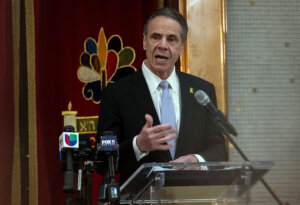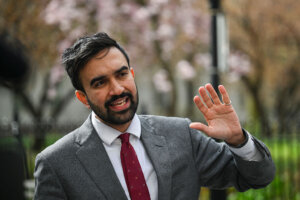(L to R) NYC mayoral candidates Scott Stringer, Michael Blake, Zellnor Myrie, Jessica Ramos, Andrew Cuomo, Whitney Tilson. Zohran Mamdani, Adrienne Adams and Brad Lander. Photo by Brad Lander, Andrew Cuomo, Michael Nagle/Bloomberg via Getty Images, Adam Gray/Bloomberg via Getty Images, Michael Priest Photography
From invoking Yiddish curses to proposing new government roles to combat antisemitism, New York City’s mayoral candidates are working hard to win over Jewish voters, a crucial bloc in the June 24 Democratic primary.
In a wide-open race, the broad outreach makes sense. New York City’s 700,000 Jewish adults have made up about 16% of the Democratic primary vote in past elections.
Experts say that number could climb past 20% this year, fueled by growing concern over antisemitism and expected lower turnout citywide. New York City is home to more Jews than any other city outside of Israel.
This year’s crowded mayoral field features candidates with deep ties to the Jewish community, and a dark horse, Zohran Mamdani, who is an unapologetic critic of Israel.
Two contenders, Brad Lander and Scott Stringer, are Jewish. Former Governor Andrew Cuomo, the front-runner according to recent polls, has long-standing relationships with Jewish leaders and Jewish family connections, including his son-in-law, Tellef Lundevall. Investor Whitney Tilson is married to a Jewish woman.
The candidates have gone to extraordinary lengths to connect with Jewish voters.
Incumbent Mayor Eric Adams, who was elected in 2021 as a Democrat, is running for reelection as an Independent in the general election on an “End Antisemitism” ballot line. He recently announced the creation of a new office to combat antisemitism.
Cuomo has made fighting antisemitism a focal point of his candidacy. He called it “the most serious and the most important issue” in the campaign.
Cuomo, Lander, and Mamdani, the Democratic Socialist surging in the polls, have released detailed plans to counter antisemitism. Council Speaker Adrienne Adams has gone a step further, pledging to appoint a deputy mayor solely focused on antisemitism and Jewish issues.
Antisemitism was up 18% in New York last year, according to a recent Anti-Defamation League survey, and 68% of the 1,437 reported incidents took place in New York City. In the first quarter of this year, according to the NYPD, antisemitic incidents accounted for 62% of all confirmed hate crimes.
A recent poll of likely Jewish voters showed that 76% of respondents agreed that antisemitic hate crimes are a very serious problem, and that the city must do a better job protecting its Jewish residents.
Common Yiddish phrases have also entered the lexicon. Stringer dropped a vulgar Yiddish epithet, schmuck, referring to President Donald Trump in his first TV ad, and Lander invoked Yiddish curses in his attacks against Cuomo and Adams.
Why it matters

Ruth Messinger, who in 1997 became the first woman to win the Democratic nomination for New York mayor, said in an interview that the elevation of antisemitism to a top-tier issue detracts from other critical issues like housing, public safety, poverty and discrimination. And that’s not good for the Jews, she said.
“It’s not the only issue you should have in mind when you’re picking a mayor,” Messinger said, recalling a quote attributed to the mid-20th Century New York mayor, Fiorello LaGuardia, that there is no Democratic or Republican way to pick up garbage. “It also skews the way the Jewish community looks to the rest of the electorate, in ways that I don’t think are helpful.”
Phylisa Wisdom, the executive director of the progressive New York Jewish Agenda group, said that while Israel and antisemitism have weighed heavily on the community since the Oct. 7, 2023 Hamas attacks on Israel, there are other major issues that Jews care about. “I don’t think all of the candidates understand the breadth of issues Jewish voters care about, or the diversity among Jewish voters,” she said.
A recent town hall with Jewish voters, co-hosted by the UJA Federation and the Jewish Community Relations Council of New York, focused heavily on the candidates’ stances on Israel and antisemitism.
In contrast, Wisdom’s group is among a slate of liberal Jewish organizations co-hosting a mayoral candidate forum on June 8 that will also cover issues like criminal justice reform, immigrants, and education.
David Greenfield, the CEO of the Met Council and a former New York City council member, said the candidates’ attention to antisemitism is crucial. “We are reckoning with an existential crisis of antisemitism that we’ve never seen before in our lives — and leadership matters,” he said. “I know that voters recognize the gravity of this moment and will choose leaders who stand unequivocally against antisemitism in all its forms.”
The power of the Jewish vote

Experts think the antisemitism crisis will drive Jewish voters to the polls in larger numbers.
Bradley Honan, who conducted the poll of Jewish voters, said that since last year, Jews have been turning out in higher-than-usual numbers, driven by what they see as attacks on their way of life and a lack of respect from some politicians.
Post-election polls showed growing support for Trump and Republican candidates in New York’s key swing districts with sizable Jewish populations amid a growing perception among Jewish voters that the Democratic Party had not done enough to confront rising antisemitism.
That sentiment deepened with the handling of pro-Palestinian campus protests, some of which devolved into hate speech and antisemitic tropes. In last year’s Democratic congressional primaries, George Latimer beat Rep. Jamaal Bowman with the help of Jewish voters who felt alienated by the incumbent’s stance on Israel and his seeming reluctance to engage with the community.
“Many more Jewish voters who are going to come to the polls who didn’t in the past could make up the difference in the ranked-choice election,” Honan said. Adams won in 2021 with the help of Orthodox support, an electorate that typically votes in blocs based on rabbinic endorsements.
Jerry Skurnik, a political consultant who worked for the late Mayor Ed Koch, also believes that Jewish voters are more likely to show up at the polls.
Skurnik, an expert on voter databases, estimated that Jews could make up over 20% of the electorate due to lower turnout among other voters. “This is the first election that I can recall that Israel and other things related to being Jewish were a factor,” he said.
This election might not be as close as the 2021 primary. But a recent poll showed Mamdani closing the gap with Cuomo, coming within single digits in the final round of the ranked-choice voting simulation.
Orthodox leaders, who split between Adams and Andrew Yang in 2021, have yet to make any endorsements. Cuomo and Mamdani have each met separately with leaders of the Satmar Hasidic sects and other key Orthodox voting blocs. Lander, Stringer, and State Senator Zellnor Myrie have also made direct appeals
Gaza war looms large over mayoral race

As in the 2024 presidential election, the Israel-Hamas conflict in Gaza has drawn heightened attention to the race. On the campaign trail and in TV interviews, it has become an unavoidable topic.
“If you’re looking for a candidate based on their positions on the war, you have a diverse set of choices,” NYJA’s Wisdom said.
Cuomo and Tilson are unapologetic defenders of Israel’s conduct, and have pledged to adopt the controversial International Holocaust Remembrance Alliance definition of antisemitism, which classifies most anti-Zionism as antisemitic. Cuomo has repeatedly targeted Mamdani and other rivals for their stances on Israel and their association with the New York City chapter of the Democratic Socialists of America, a group widely condemned for lauding the Oct. 7 Hamas attacks a day after they occurred, at a demonstration in Times Square.
Mamdani, who co-founded the Students for Justice in Palestine group at Bowdoin College when he attended from 2010 to 2014, has come under scrutiny from both his hard-line anti-Israel base and pro-Israel groups for balancing his leftist views on the Israeli-Palestinian conflict with recognition of Israel’s right to exist.
Mamdani, polling second behind Cuomo, including among Jewish voters, has doubled down on his unabashed past criticism of Israel while insisting that he can still get a substantial portion of Jewish votes by engaging with the community. “What I strive to show is that it’s a disagreement still based on a shared sense of humanity, not a disagreement that is based on the bigotry that is often characterized of these positions,” Mamdani said at a recent event.
In an interview with a Muslim outlet, Mamdani boasted that he has been “the foremost advocate” for Palestinian human rights. In a recent appearance at a local mosque, he labeled Israel’s exploding pager operation against Hezbollah in Lebanon last September as a targeted attack against civilians. He also faced backlash over his failure to co-sponsor resolutions marking Israel’s independence and the Holocaust.
Greenfield called Mamdani’s stance “scary” and one that “undermines the safety and well-being of Jewish New Yorkers.”
His positions on Israel have not diminished Mamdani’s chances for an upset. A PIX11/ Emerson College poll of 1,000 registered voters published on Wednesday showed that a plurality of primary voters — 46% — say it’s not important for the next mayor to be supportive of Israel, while 33% say it is important to be pro-Israel. The poll had a reported margin of error of plus or minus 3% and did not include a sample of Jewish voters.
Lander, polling a close third, is trying to chart a middle path. He’s drawn a line between his liberal Zionist stance and voices on both the left and right who have either excused the Oct. 7 attacks or minimized Palestinian suffering. Unapologetic in his criticism of the Israeli government, Lander has called for a permanent ceasefire and recently described Israel’s control of the occupied West Bank as “ongoing apartheid.”
Stringer, who was the leading progressive candidate for mayor in 2021 before his bid was derailed by allegations of sexual misconduct, which he denied, has more moderate views on the Israeli-Palestinian conflict. “When people question Israel and they question our alliance with the Jewish people, the first thing I say to them: tell me that Hamas is a terrorist organization,” Stringer said in a recent speech. “If you can’t say that, then you don’t stand with us.”
Michael Blake, a former state legislator who is polling below one percent, walked back his statement made on Oct. 13, 2023 that Israel was committing genocide in Gaza. “It was wrong language to use,” Blake said.

